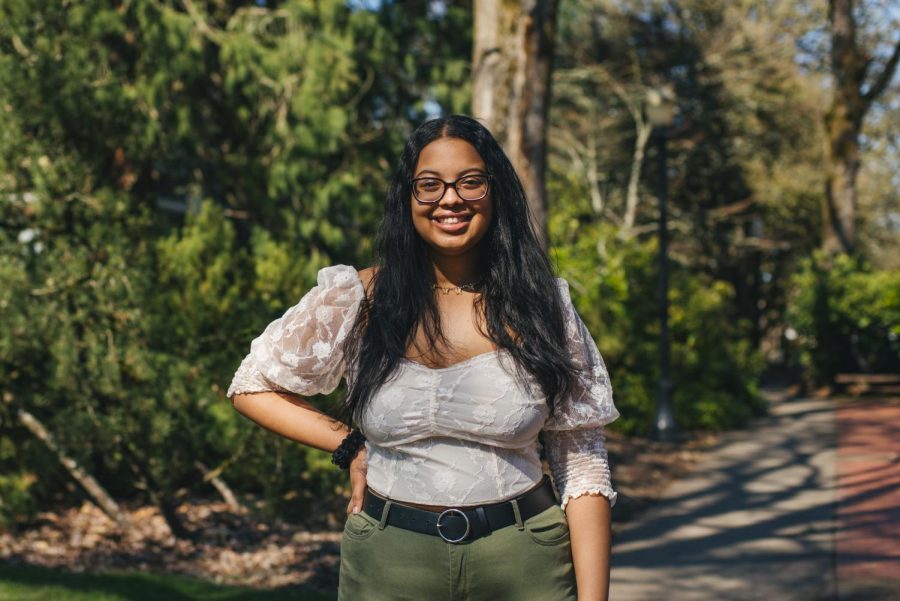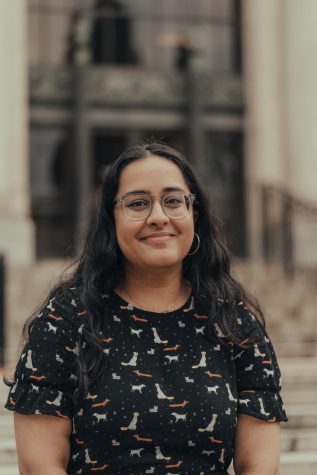OSU sustainability clubs celebrate Earth Day, aim to help university reach carbon neutral goal
April 12, 2021
Waste Watchers is just one of the dozens of sustainability clubs at Oregon State University fighting to save the environment.
Nabila Hersi, a first-year political science student minoring in sustainability and sociology, and Lily Butler, a third-year student studying natural resources and sustainability are both co-coordinators for the Waste Watchers club.
“Waste Watchers is a sustainability club on campus that tackles waste reduction and creates awareness on environmentalism and sustainability and how to be more eco-friendly,” Hersi said in an email.
According to Butler, Waste Watchers is sponsored by Campus Recycling and Community Engagement and Leadership.
“We strive to have our programming mirror the priority levels of the waste hierarchy—from most to least important: prevention, reduction, reuse, diversion—and demonstrate our commitment to advancing diversity, equity, inclusion and justice, both in how we design our work and how we educate ourselves and our members,” Butler said in an email.
Butler said Waste Watchers tries to balance outreach and programing to push for both individual and institutional changes.
For Butler, Waste Watchers is important because it is a community of like-minded people who are passionate enough about waste reduction to donate their time to educating and empowering others to make a change.
Despite social gathering restrictions due to the COVID-19 pandemic, OSU community members have continued sustainability efforts throughout the year to raise awareness about the environment.
Though virtual events and meetings have changed the dynamic of Waste Watchers, Hersi said they have tackled any issues that arose.
“Since the pandemic started, we have been meeting with our members online and have hosted several virtual programs,” Butler said. “Our members have produced an online DIY demo library as a substitute for our traditional Repair Fairs, and we are currently planning a sustainability challenge for Beyond Earth Day!”
Hersi encouraged people to research, shop locally, limit buying fast fashion clothing or start using reusable utensils and water bottles if they can.
“I wish OSU was a lot eco-friendlier, but things will take a very long time to completely be eco-friendly,” Hersi said. “We just have to keep the pressure and encourage people to be more eco-friendly and reduce waste.”
Butler also said OSU could do a much better job of centering the issue of consumption in their sustainability efforts.
“98% of an item’s carbon footprint comes from its production and consumption, so by making purchasing guidelines that align more with OSU’s commitment to be carbon neutral, they might be able to reach their goals faster,” Butler said. “There are also a lot of efforts I’ve seen at other universities that I think OSU should implement, like requiring everyone to have their own reusable bottle for drink purchases and only selling drinks in metal cans as opposed to plastic bottles.”
Keith Jayawickrama, from the College of Forestry, and Shelly Signs, the director of University Events at OSU, are both co-chairs of the Ad hoc Committee on the Carbon Commitment—also known as C3.
In 2007, former OSU President Ed Ray signed the American College and University Presidents Climate Commitment, which is now known as the Carbon Commitment.
As part of this carbon neutrality goal, Jayawickrama and Signs said OSU set an ambitious goal of carbon neutrality by 2025, and to support meeting this goal, the Faculty Senate formed C3 in 2018.
“We recently organized the Jan. 12 forum which reminded the OSU community about the Carbon Commitment which was made in 2007,” Jayawickrama and Signs said in an email. “This was attended by 200 people. We also submitted our first report to the Faculty Senate in early 2020.”
Past OSU sustainability actions and current OSU plans were shared in the forum, which included retro-commissioning buildings, solar panel installation and increasing visibility and support for carbon reduction goals. These details can be found on OSU’s climate action website and the Strategic Plan 4.0 for 2019-2023. OSU’s fiscal year 2020 gross emissions were 119,630 metric tonnes carbon dioxide equivalent, a 13.05% decrease from fiscal year 2019; reductions were attributed to reduced electricity consumption and reduced air travel.
Jayawickrama and Signs said they are interested in promoting carbon reduction efforts at college and department levels, in addition to centrally-administered initiatives. This keeps the Faculty Senate informed of progress and activities and keeps the imperative for carbon reduction in front of OSU faculty, staff and students with the aid of community updates like the Jan. 12 forum.
Additionally, Butler said OSU has a lot of work to do in terms of environmental and racial justice on campus.
“As a student—not speaking for Waste Watchers or Campus Recycling—I have felt extremely disheartened by the response that [university] admin has given to student-led campaigns like We Can Do The Work,” Butler said. “In general, I wish that students’ concerns would be taken more seriously.”
Andrea Norris has been club advisor for the Waste Watchers club since 2012 and is also the marketing and development coordinator for OSU Materials Management.
Norris said there are different facets of recycling, waste and surplus management at OSU.
“Materials Management is the group on campus that includes the university’s Campus Recycling and Surplus Property departments and our co-sponsored club the Waste Watchers, meaning the majority of the university’s landfilled waste, recycling, composting and reused goods funnel through our program in some way or another,” Norris said. “My role within that is focused on outreach, engagement and special projects to enhance our programs.”
Norris’ role includes coordinating recycling and surplus events, presentations, digital and print communications, pilot programs and partnerships with other groups, as well as advising the Waste Watchers club.
“Through these responsibilities, I aim to contribute to reducing, reusing and recycling waste at OSU through institutional and individual behavior change,” Norris said.
Norris said OSU has a long-standing history of leading environmental sustainability endeavors, including when students came together around the first Earth Day in 1970 to start a community recycling program.
“In terms of waste and materials, our biggest areas for growth are in the areas of consumption, waste prevention and reuse,” Norris said. “The majority of a product’s environmental impact comes from manufacturing, transporting and using it, not how it is disposed of. Therefore, we stand to make the greatest impact by focusing on materials we buy and use. For example, we have been collaborating with [University Housing & Dining Services] recently to discuss opportunities to reduce the use of disposable cups on campus and how to bring back the Eco2Go reusable to-go container program.”
To break down sustainability for those who may not have much exposure to it, Butler said she would emphasize that sustainability has three equally important and interconnected pillars.
“They are social sustainability, economic sustainability and environmental sustainability—and you cannot have one without taking the others into consideration,” Butler said. “This also means that anyone can get involved in sustainability and everyone can find something within the field that matters to them.”
Butler said that though individual actions to support sustainability are important, especially for developing a sense of identity and connection with others, creating policies to support more sustainable systems and institutions is even more important.
“In conclusion, there are many ways to be sustainable and it is not just about knowing how to recycle or cleaning up parks,” Butler said. “I would recommend that everyone take at least one sustainability class before they graduate and check out the list of clubs involved with sustainability at OSU.”
Norris explained that taking action to reduce human impact on the environment is how we all take care of the community.
“It’s how we strive for clean air, land and water, which helps everyone thrive,” Norris said.
Norris’ tip for students to get involved is to connect with organizations working on sustainability.
“There are ample ways to learn online, but it’s likely to be more effective and a whole lot more fun to connect with others in your local community, where you can learn through conversation, plug in to efforts where you can make an immediate impact and find solidarity with people,” Norris said. “Especially now, when we need to connect more than ever.”











































































































